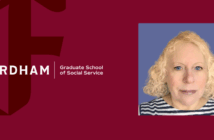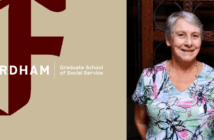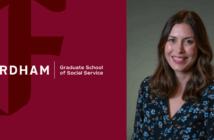On July 15, 2020, from 6 – 7:30 p.m., The Graduate School of Social Service’s Action Committee for Racial and Social Justice held its first meeting for what will be an active and ongoing process of structural change, and promoting an anti-racist future.
The Committee, spearheaded by Dr. Binta Alleyne-Green, associate professor and director of field education at GSS, defines its purpose as:
“To provide a mechanism through which GSS community members can engage in coordinated efforts that promote anti-racism using an intersectional lens and address social injustice, specifically white supremacy within our own institutions (GSS and Fordham University) as well as the larger social contexts of New York City, the United States, and globally.”
In addition, committee membership is open to the entire GSS community – including students, staff, faculty, alumni, administration, and other key stakeholders – interested in working toward that purpose.
The Precedential Meeting
The meeting opened with an introduction from Alleyne-Green and Associate Director of Admissions Stephen McGowan. They welcomed guests with a presentation of “Why We Have All Come Together,” citing the structural change long overdue at GSS as an institution, and in the community at-large. In this presentation, the Committee also put forth its definitions of both anti-racism and white supremacy.
Dr. Laura Wernick, an associate professor at GSS, followed by addressing some of the community agreements set for the meeting. These included things such as active listening, being present, equitable discomfort, and honoring people’s stories – among many others.
“If you’re someone who tends to be a bit shy, try your best to voice your ideas,” Wernick said. “And if you’re someone who is generally outspoken, maybe take this time to work on your active listening.”
Wernick made sure to remind everyone that this is a process. She noted that the Committee didn’t expect to solve racism in one, 90-minute meeting, but that it’s the first step in a series of advocacy actions.
Staying Centered and Breakout Groups
In a meeting focused around racial and social inequalities, there are bound to be some tough and uncomfortable conversations. To prepare for this, the Committee took some time before discussion to focus on centering inward.
Dr. Derek Tice-Brown, an assistant professor at GSS who specializes in complementary and integrative health practices for depression and anxiety, invited guests to participate in a meditation exercise. He asked participants to close their eyes, roll their shoulders back, and try to release tension that may have built up in anticipation for any difficult dialogues.
“Notice that when you roll your shoulders, it opens up your heart,” he said. “And this is how we lead the fight against oppression – with our hearts.”
After Tice-Brown’s exercise, the Committee brought forth one more item to remind everyone “why we are all here.” Dr. Lauri Goldkind, GSS associate professor, read aloud An Invitation to Brave Space, a poem by Micky ScottBey Jones, which focused on amplifying voices that aren’t heard elsewhere, and fighting through all of our scars to create a brave space. For some perspective, in the 125-word poem, the powerful pronoun ‘we’ is included 14 times.
For the next 40 minutes, participants were divided randomly into breakout groups – with each group assigned a “facilitator” from the Committee. Facilitators asked four main questions for insight into the participants’ motivations. These questions included: “What brought you here?” “What would an anti-racist GSS look like to you?” “What would it take to get there?” And “What outcomes would you like to see from this group?”
The groups provided all different stakeholders within the GSS community to voice their opinions and ideas for a better future. In addition, the random selection provided a mix of perspectives, which allowed a cross-pollination of viewpoints from around the school.
To conclude the meeting, guests received a survey to fill out based on their expectations and future involvement with the Committee. Action options ranged from signing up for emails, to helping organize events for voter registration, and subcommittees dedicated toward internal or external change.
And for this committee, action is the key component.
“We want to have measurable outcomes,” Alleyne-Green said. “This will not be a committee where things get discussed, but no action is taken.”



